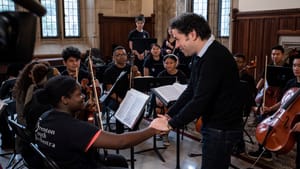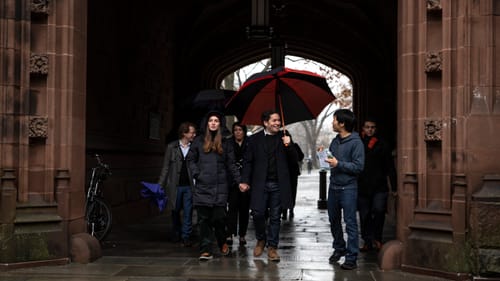Stay in the Loop
BSR publishes on a weekly schedule, with an email newsletter every Wednesday and Thursday morning. There’s no paywall, and subscribing is always free.
Air, food, water, music
Princeton University Concerts presents Gustavo Dudamel in conversation on El Sistema

What if music was as essential as food, water, shelter, and air? What if it was the birthright of every human being? Maestro Gustavo Dudamel, continuing his residency at Princeton University, opened up about El Sistema in a January 9 panel.
What if, instead of being an afterthought, subject to the first budget cuts, music was the foundation of our lives and civilizations? What if it brought people together and built communities?
It’s not a science-fiction future, humanities style. It’s happening right now. As a public-school music program born in Venezuela, El Sistema isn’t without critics, but it’s electrifying the world of music education. Some 700,000 Venezuelans now participate in El Sistema, which has spread rapidly in the United States and in some European countries. It’s redefining music and other arts as indispensable building blocks of character and human development. And it’s doing so with joy, exuberance, and buy-in by students, teachers, and families alike.
Child of El Sistema
At Princeton’s January panel in a packed campus hall, Gustavo Dudamel spoke about the new way music and the other arts are being defined and etched into the public-school curriculum. Dudamel himself was a child of El Sistema, growing up in Caracas under the tutelage of José Abreu, who founded the system in 1975 and died last year.
“How do I describe the Maestro?” Dudamel mused, his eyes misting over. “An angel” — someone who would answer the phone at two in the morning to help a young conductor. The warm relationships between teachers and students and the eagerness of students to learn and play together are some of the reasons El Sistema has taken off when other music programs have fallen by the wayside.
“We talk of building community,” Dudamel continued, “but an orchestra is a community. In a few days of working together, you move from nothing to creating something beautiful, and you love it!” Unlike the stereotype of elitist classical musicians and orchestras, El Sistema educators have discovered that music is an integral part of the human experience. “Music is a tool for social change,” the conductor said.
El Sistema exports
This philosophy has also caught fire in Philadelphia. The Play On, Philly! program (founded in 2011) takes inspiration from El Sistema, providing music education to students who would typically lack access to it, as a vehicle for life skills and academic achievement.
The next speaker on the panel was Princeton student Lou Chen, who related his own experiences founding the Trenton Youth Orchestra three years ago. Eloquent and enthusiastic, the young music major recalled early rehearsals at 7:30am in Trenton home. With the encouragement of Princeton University, he recounted bringing Trenton Central High School students into Princeton for lessons, rehearsals, and performances. Today there are more than 20 students enrolled in the program. “Teachers participate in the program for free,” Chen said. “Maestro Dudamel is busting the gates wide open… to encourage partnerships of this type throughout the nation.”
A third panelist was Anne Fitzgibbon, a Princeton alum and founder and director of The Harmony Program in the greater New York City area. She spent a year in Venezuela on a Fulbright scholarship.
“What most impressed me,” she said, “was how Venezuela was building community, through music, one child at a time. Children everywhere need three things to live and to thrive: a sense of security, a sense of belonging, and a sense of identity. My year in Venezuela convinced me that music may be the most effective way of providing those necessities for young people.”

A transformational need
Dudamel is in the midst of a three-part residency in Princeton this season to celebrate the 125th anniversary of Princeton University Concerts. During this part of the residency, he has been working with Trenton students and teachers to build musical skills, which will come to fruition in the spring when he returns to conduct the young people in performances of Schubert, Tchaikovsky, and Mendelssohn in both Trenton and Princeton.
For me as a music journalist, one of the most remarkable dimensions of this panel was the palpable enthusiasm, unwavering attention, and engagement of the teachers, students, volunteers, and musicians in the audience. It was as though the audience, too, was part of the panel: throwing out a translation, laughing, sharing a reverent silence, nodding and repeating a phrase. Throughout the program, the word transformational arose time and again, with Dudamel reminding us that it is audiences as well as musicians who are transformed by music.
I also was taken with the notion of music as an indispensable component of existence (a fact already known to all music lovers) instead of a luxury program that's safe to cut in a budget crunch. Can the El Sistema approach truly be the pathway to integrating different varieties of music, inspiring students, and balancing STEM curricula with creativity, camaraderie, and the expression of beauty? I imagine music of all types celebrated and played together on the same program, being added to Maslow’s Hierarchy of Needs, part of that big, fat foundational layer at the bottom of the chart, along with water, food, and air.
What, When, Where
Gustavo Dudamel, in conversation with Lou Chen and Anne Fitzgibbon, moderated by Stanley Katz. January 9, 2019, at Princeton University’s McCosh Hall, 10 McCosh Walk, Princeton, NJ. (609) 258-2800 or princeton.edu.
Sign up for our newsletter
All of the week's new articles, all in one place. Sign up for the free weekly BSR newsletters, and don't miss a conversation.

 Linda Holt
Linda Holt